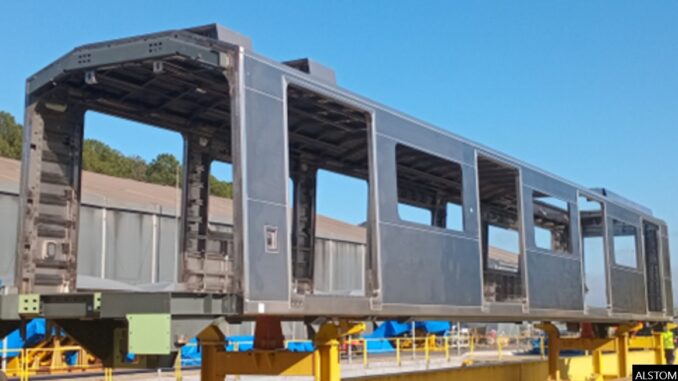
Alstom has completed the first bodyshell for a series of trains it is building at its factory in Taubaté, Brazil, for Santiago Metro’s Line 7.
In total, 37 trains five-car trains will be manufactured as part of a contract between Alstom and Metro de Santiago, Chille. The contract also includes the supply of an Urbalis CBTC signalling system, a maintenance contract that spans 20 years and a complete predictive maintenance system for the trains, tracks, and catenary for the Chilean capital’s metro.
Manufactured from stainless steel, Alstom’s Metropolis trains offer both durability, they have a lifespan of over 40 years, and reduced electricity consumption. 102 metres long and capable of carrying up to 1,250 people, the trains will feature four wide doors per side of each car to facilitate users’ entry and exit, spacious corridors, and open walkways between cars to ensure smooth passenger movement within and between carriages.
The Santiago Metropolis trains will also be equipped with air conditioning and an advanced passenger information system providing route and station updates, USB charging ports and a cybersecurity system. This safety network will also include high-resolution cameras and intercoms, allowing users to communicate with the metro’s control centre.
Currently under construction, Santiago Metro Line 7 will be 26 kilometres long and will include 19 stations. The line will pass through seven districts: Renca, Cerro Navia, Quinta Normal, Santiago, Providencia, Vitacura, and Las Condes; three of these (Renca, Cerro Navia, and Vitacura) will be served by the Metro network for the first time, benefiting an estimated population of 1.4 million inhabitants.
Once Line 7 is operational, the expected travel time between the future terminal stations is estimated at 37 minutes, representing a 54% reduction in travel time compared to the current bus system (approximately 80 minutes).

Denis Girault, general manager of Alstom Chile, said: “The production of the first carbody shell marks an important milestone among the many to follow in this train manufacturing process.
“These trains will not only enhance the quality of mobility and transport in Chile by ensuring reliable, safe, and accessible transportation, but will also offer the city of Santiago an efficient and environmentally friendly means of travel for millions of passengers.”
With more than 600 employees across eight centres, Alstom is present in Chile with its metro trains, regional trains, signalling systems, and infrastructure and maintenance services. The company takes part in the country’s main railway projects, including those for Metro de Santiago, EFE Valparaíso, and the State Railways Company (EFE), such as the Alameda-Nos line.
So far, Alstom has supplied Metro de Santiago with the NS74, NS93, AS02, NS04, and NS16 fleets. These will soon be joined by the new AS22 trains for Line 7.


Be the first to comment